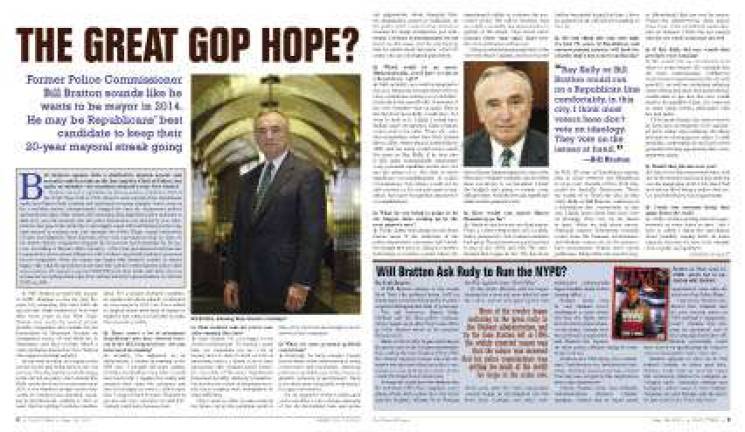From the Archives: Bill Bratton on his political future in 2011

In May of 2011, speculation about who might run for mayor on the Republican ticket landed briefly on William Bratton, former NYPD Police Commissioner under Mayor Rudy Giuliani, from 1994 to 1996. Bratton had recently finished a 7-year stint at the chief of police in Los Angeles and had returned to New York to work in the private sector. Our Town interviewed Bratton amid the political rumors about his philosphies on city government and policing ("The Great GOP Hope?" May 18, 2011).
Now, Bratton has been appointed incumbent police commissioner by Mayor-elect de Blasio. Below are excerpts from our 2011 interview that may shed light on how he will approach his new/old post come January.
On his political leanings:
"Politically, I'm fairly complex. People tend to think of law enforcement as being conservative and reactionary. American policing is probably one of the most progressive elements of government. There is no entity more integrated, with minorities, gays and women. I'm an opponent of three-strikes-and-you're-out laws. I was a strong opponent of the old Rockefeller laws and spoke out aggressively about changing that."
On the future of police work:
"The next era of policing, and indeed government, is predictive government. That with the algorithms you develop, and the information at hand, you can predict emerging problems and basically head them off. I'm more into it from a policing perspective, certainly."
On race relations in the city:
"I think race relations in New York are much better than they were. I attribute that to a much safer city, because then, as now, unfortunately, the significant majority of serious crime is committed in the African-American community, by the African-American community, and that was the case back in the '90s and still remains the case, even though crime is down 70 or 80 percent. The more you reduce crime in a city, the more you improve race relations, because the black and brown community, the bulk of crime occurs there, and is committed by that population. By reducing that crime problem in New York, it allows for the city to collectively take a big sigh. The city is a very different place than the city I visited in 1989 for the first time."